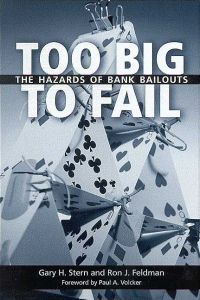Join getAbstract to access the summary!

Join getAbstract to access the summary!
Gary H. Stern and Ron J. Feldman
Too Big to Fail
The Hazards of Bank Bailouts
Brookings Institution Press, 2004
What's inside?
A thorough exploration and profound reflection on the risks of the “too big to fail” doctrine
Recommendation
In this clearly prophetic book, Gary H. Stern and Ron J. Feldman examine the “too big to fail” doctrine, and show how policymakers made the financial system riskier by implicitly promising to bail out the biggest banking institutions. In the wake of the global financial crisis in which several major institutions failed in 2008, getAbstract welcomes this reissued, lucid assessment of one of the most perplexing, perverse policies in financial regulation, the idea that some institutions are too big to fail. Former Federal Reserve Chairman Paul A. Volcker’s foreword helps sharpen the book’s focus, and the authors’ advocacy for an end to bailouts is quite persuasive. This book is recommended reading for anyone seriously interested in understanding the calculus of financial policymakers, financial system risk, and the tilted playing field that benefits huge, risky banks and their shareholders.
Summary
About the Authors
Gary H. Stern is president and CEO of the Federal Reserve Bank of Minneapolis, where Ron J. Feldman is senior vice president.

















Comment on this summary